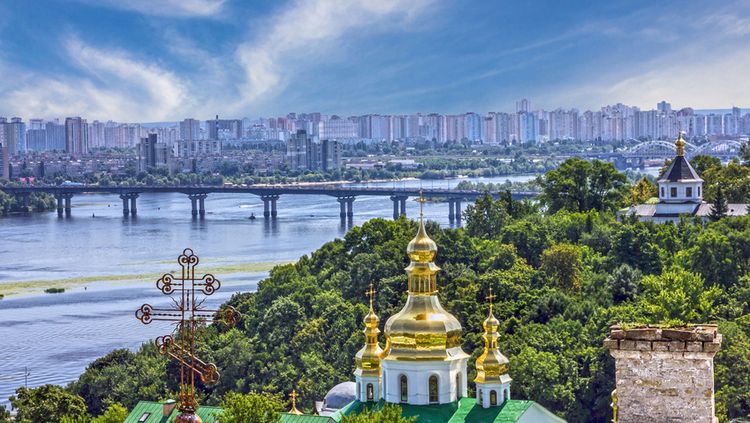People in central Ukraine often speak a mixture of Russian and Ukrainian. Slavicist Gerd Hentschel is studying the phenomenon on location – and experiencing the consequences of the political crisis first-hand.
"Crimea was always Russian," a first-semester student of Slavic Studies recently told Gerd Hentschel. This sentence is incorrect from a historical perspective: Crimea didn't become part of the Russian Empire until the end of the 18th century. And the fact that Russians are the largest ethnic group on the Crimean Peninsula is a result of the expulsion of the Crimean Tartars, originally the largest ethnic group after World War II. Hentschel pointed this out, showing understanding for the mistake: "Basically young people, especially those from the East, can't know any better."
Slavicist Gerd Hentschel is hoping to provide a more nuanced view of the situation with his current research project on Ukraine sponsored by the Fritz Thyssen Foundation. The subject of his research is the languages in everyday use in the vast area of central Ukraine: often neither pure Ukrainian nor pure Russian, but in many cases a mixture of the two.
This language is called "Surzhyk", which translates as "low-quality flour or bread". The disparaging overtone is not without reason. The phenomenon is traditionally regarded by the nationalist intelligentsia as "contaminated" Ukrainian. In linguistic maps of the country Surzhyk, which is spoken daily by millions of people in large areas of Ukraine, is something of a blind spot – only Ukrainian and Russian are taken into account. Yet many people use all three "languages", depending on the situation. Hentschel is trying to clarify this phenomenon from both a linguistic-sociological and a sociolinguistic perspective. He wants to replace the unsystematic observations made so far on Surzhyk with broad-based empirical statistics.
Hentschel has always been interested in the question of what happens when languages converge. "Such contacts produce something new," he explains. In an earlier large-scale project Hentschel examined another mixed form of speech: the "Trasyanka" spoken in Belarus, which is a combination of Belarusian and Russian. These mixed forms of speech are for a large part combinations of dialects and the dominant standard language, like those we are familiar with in many southern German cities. "In Belarus and Ukraine, however, standard Russian, and not Belarusian or Ukrainian respectively, was the dominant language both in the times of the Russian Empire and in the Soviet era," Hentschel points out.
After Ukraine gained independence in 1991 Ukrainian became the sole official language. In Post-Soviet Ukraine Russian has been demoted to the legal status of a minority language with relevance only in some parts. Yet Russian is still very much present in the country today. "Good Russian-language skills actually seem to be becoming more common among younger speakers, except in the predominantly Ukrainian-speaking West in and around Lviv." Hentschel adds that at the same time good knowledge of the Ukrainian language also seems to be becoming more widespread, which according to him is not paradoxical but testifies to the growing prevalence of high-level bilingualism. Western Europe's perception of Ukraine – on the one side the "Russian" South and East, on the other the "Ukrainian" West – is far too simplistic, says Hentschel. "It doesn't do justice to the situation in the country." Only the eastern-most area, the so-called Donbass region, is clearly oriented towards Russian in the way Crimea is. And only the extreme west, the area surrounding Lviv, is almost exclusively oriented towards Ukrainian, he explains. "The vast area between these two regions is unclear."
And in this area Hentschel conducted a survey in which around 1,400 people were asked about their language orientation and attitude towards the languages spoken there. 150 of them are being interviewed in more depth, namely those who freely admit to speaking stigmatised Surzhyk on a regular basis. "With the group that admitted to speaking Surzhyk, the answers they give in open interviews are recorded for linguistic analysis. That means the interviewer must feel comfortable speaking Surzhyk in order to get the interviewees to talk as they do in everyday life," Hentschel explains. Many people agreed to take part in the time-consuming interviews – and many of them then cancelled. "There are always cancellations, but in this case the number was surprisingly high."
These people had given their consent to be interviewed at a time when the Russian invasion of Crimea had already been completed but the bloody fighting in the Donbass region was yet to come. "It is likely that many cancelled with the fighting in mind, particularly since the government in Moscow claimed one of the reasons for its actions was the alleged language conflict and persecution of Russian speakers in Ukraine after the Euromaidan," Hentschel concludes.
In Hentschel's opinion the situation has clearly made many people more sensitive about their use of language: "This was also reflected in the fact that many people started trying to speak Ukrainian in an artificially unadulterated Ukrainian and to avoid using the Russian elements of Surzhyk." Many Ukrainians became more "Ukrainian" after the events in Donbass, Hentschel explains. This has meant that some of the interviews can't be used. Nevertheless, two-thirds of the interviews needed for reliable empirical evaluation have already been gathered, and the remaining third are currently under way, Hentschel reports.
There are however no indications of a widespread, deep-seated language conflict within the population, he stresses. "The question of language orientation – in other words whether an individual speaks mainly Russian, Ukrainian or Surzhyk in their everyday life, has nothing to do with national identity as far as many people are concerned." In particular it is not possible to conclude from the fact that a person mainly speaks Russian that that person defines themselves as Russian, Hentschel explains, noting that even today Kiev is still seen as the "Russian-speaking Lviv" – Lviv is considered a bastion of strong national Ukrainian orientation. Hentschel expects the gathering of data to be concluded by next autumn. Then the in-depth analysis begins.




